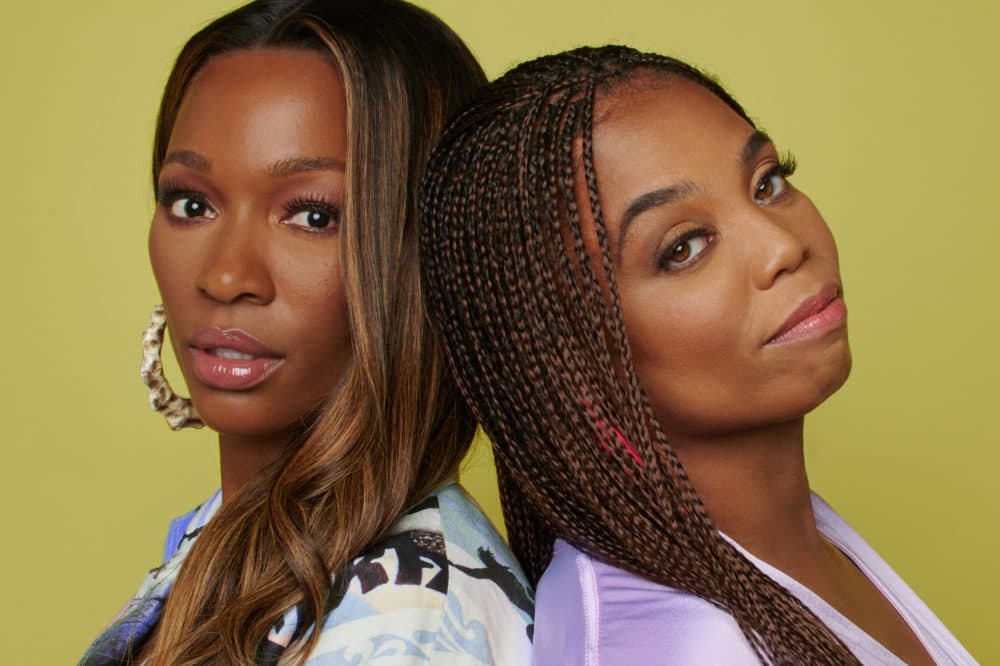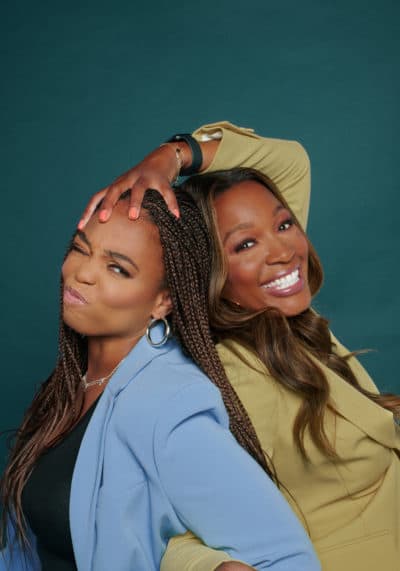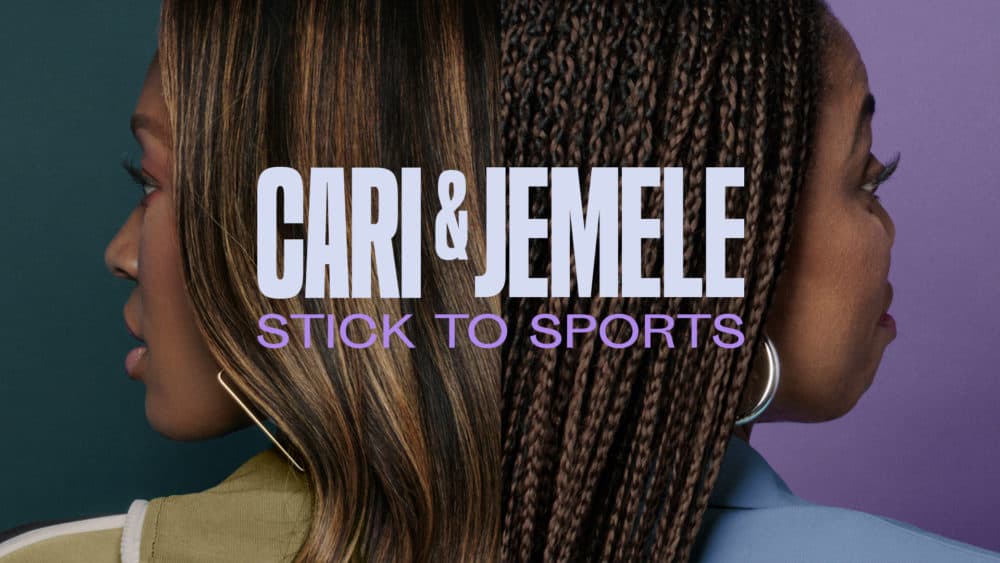Advertisement
Cari Champion And Jemele Hill Won't 'Stick To Sports'

OK, confession time: When we realized that today would be our last new show, we really wanted to knock it out of the park with an A-list guest — someone who epitomizes what we’ve been saying for the past 27 years: that sports is important for reasons that have nothing to do with what happens on the field, court or ice.
So, of course, the first person who came to mind was LeBron James.
Unfortunately — we were told — LeBron was focused on the playoffs and would not be available for an interview. (This was long before the events of this week and calls for the cancellation of the NBA season.)
But while we couldn't get LeBron for the last real episode of NPR’s only sports show, he did make an appearance on the premier episode of "Cari & Jemele: Stick to Sports," a new show on VICE TV.
Cari Champion and Jemele Hill met at ESPN. (Cari calls the network "the four letters.")
They both left — walking away from what a lot of people would see as "dream jobs." And now, they’re doing something that hasn’t really been done before — as two Black women hosting a late night TV show on a mainstream network.
Cari Champion and Jemele Hill joined us to talk about their friendship, their vision for their new show and more.
Karen Given: So, tell me the story of how the two of you became friends.
Jemele Hill: I'm gonna let you tell that.
Cari Champion: You guys, it's just not a good look ... for me. I stumbled upon the job as "First Take" host/moderator. I went to my old agent, and I said, "The girl who was supposed to get the job that I got, i.e., Jemele Hill, wants to have dinner. Should I talk to her?" He was like, "Be very careful. You just never know. She might, you know ..." And I was like, "Yeah, you know, how it is. These women, you know how they are. They're very, very, very petty."
And there had happened to be a few headlines, too, prior to me arriving that suggested that she might be upset that I got the position over her. But we go have dinner, and she — for every every reason that I did not want to hang out with her, every reason why I did not want to have dinner with her, she proved me correct.
"The expectation was that the person who was the moderator should just shut up ... I didn't like that that was the case. And I was trying to warn her."
Jemele Hill
JH: But not in the way you're thinking. I wasn't like, "How dare you take my job?" It wasn't one of those things. It was just that I had been there at that point six years. So I had six years worth of stories, experiences. And I knew with that job there was an expectation there that I thought was, frankly, very demeaning to women. The expectation was that the person who was the moderator should just shut up. You know, you just take them in and out of commercial. You know, they treat you like a prop. I didn't like that that was the case. And I was trying to warn her.
CC: She was correct.
JH: Yeah.
CC: She came in and rained on all my parade, and she was like, "Let me tell you something. They treat you bad. It ain't right. I hate to see you being treated like poop."
JH: That was a really high profile job. And so for a Black woman to have that job, to me, that was the win for all of us. And so I was so invested in her success before she became my friend because I'm like, "This gotta work. I don't know when we gon' get this chance again." So I came off probably a little too strong and being like, "You gotta fight the power!"
Advertisement
CC: I was like, "I'm just here for the burrito." I didn't know I was gonna have to step the whole party together and be Harriet Tubman and lead us to freedom. I didn't know. So anyway, fast forward — too late — I had a lot of tough ups and downs. I needed an ally. I needed a disruptor. I needed someone who had credibility to defend me. And she was all of those things. And many, many times she came to my rescue. She refused to let the gentlemen that I worked with ignore me without acknowledging that they are doing so, and it is to their detriment. And we became really good friends. And vice versa, when she got in her bubble of trouble, I always defended her, you know what I mean? Because what she did for me was unheard of — for me as a woman. The world that I had lived in, women didn't often do that.
KG: So, Jemele, let's talk about your "bubble of trouble." It started with a tweet on Sep. 11, 2017. So remind us about that tweet and the response to it.
JH: Well, it was on that day that I told the truth about our president.
I honestly did not think it was a big deal, because I thought that everybody sort of had come to that conclusion, particularly in the wake of Charlottesville.
It all registered to our ears the same way that, you know, trying to equate people protesting against injustice with people trying to incur hatred. So, I thought after that moment that people had basically come to that conclusion. But it turns out it was breaking news. Sarah Huckabee Sanders said that it was a fireable offense, and Donald Trump blamed me for low ratings at ESPN. So it was...
CC: OK, wait, interjection. I'm gonna take a :30. If she was a Black man, it would have been handled differently. I know that for a fact. If she was a white woman, it would have made more headlines in the sense of, "Why are they doing that? And why is no one protecting her?" Women's organizations would have came to her defense. In fact, dare I say, the organization which we had worked for would have came to her defense.
And this is why Black lives matter — the blatant disregard for her Black life, her Black career, her Black stance was so bold and so disrespectful. It broke our hearts to the core. It told me that I didn't matter anymore. And she handled it with so much grace and class and resilience. She handled it that way with the "four letters." She handled it with friends and family. She handled it when she came back to work, and when she ultimately decided to leave on her own terms. And it is such an example of how grace and mercy supersedes all. Because I would wake up super early. I was on the West Coast, she was on the East Coast. I was like, "Who we got to f--- up? Who we got to fight? I'm so pissed off." Like, I was so angry.
JH: I had to calm her down.
CC: She was calming me down, and I wasn't even dealing with it. No one came to her rescue. And that was pretty disgusting because we see who this man is.
KG: So Jemele left the network in 2018, as you say, on her own terms. And then much more recently, Cari, you showed up at her house with a bottle of wine and a camera crew to record a pilot episode. I mean, did you tell her you were coming?
CC: Well...
JH: Yeah, I think you told me.
CC: But she don't — Listen: If you're Jemele's friend, she's like, "All right, I'll see you." ... She has 20 things going on. I could have showed up with a stripper. She'd have been like, "I don't remember you telling me anything about the stripper coming."
JH: Because I was doing so many things, Cari, essentially, kind of took the initiative. Like, "I need to just show up at her house. I got some wine, so I know she's gonna let me in. We're gonna get this done." Without her showing up with that Belle Glos, we are not here today.

CC: You gotta try it.
KG: So what are you hoping to do with this new show? What do you — what do you want it to be? What are your dreams for it?
CC: My dream is that, the same way that we're sitting here talking to you, and I feel that you, Karen, are on the same page that we are — and Martin, behind the scenes. I think so much of where we are right now in this country is that we simply just don’t have the understanding or the compassion to see other people the same way we see ourselves or a loved one.
Our stories are about fairness, equality, justice. There's a small window where you guys are paying attention — and by you I don't mean to throw you in the bucket of all white people, but I mean the world — is paying attention. There's a collective pause and we have your attention.
KG: And this show is going to — I mean, it's called "Stick to Sports." And we all understand that it's not going to stick to sports. Will it be sports adjacent?
JH: That's probably a good way to put it. I mean, look, sports issues, as we have seen especially lately in the last few months — many of those issues are just a microcosm of society. It's always been that way in sports. Everybody's not going to be an athlete. We’re certainly gonna have some politicians, entertainers. They'll run across the gamut. But we have to stop with this lie of: Sports is happening over here, and the rest of the world is happening somewhere else. They're in the same world.
KG: So I'm gonna have to let you go very soon because you are two very, very busy women. But before I do, I am hoping that you have some advice for me because I am about to be — hopefully very temporarily — unemployed. And I will join an absolutely unprecedented number of Americans who are looking for work right now. And some of them, like me, are at the end of what they once thought of as their dream job. So I'm wondering if you have any advice on how to get through this?
CC: I'm gonna tell you it’s just the beginning. I think you're smart, thoughtful. You won't be unemployed for very long. And your next position — I can claim it — will be bigger and better than you've ever imagined. Every end for me has been the beginning of something bigger and greater than I have ever imagined.
JH: You should view this as an opportunity. This is something that I think as women period, we struggle with doing. All your experiences professionally, personally, have prepared you for this moment. You have to lean into that experience.
CC: In translation: You the s---.
JH: She said what I wanted to say, only smarter.
"We have to stop with this lie of: Sports is happening over here, and the rest of the world is happening somewhere else. They're in the same world."
Jemele Hill
KG: I really thought that you were just going to tell me to get a bottle of wine and have my best friend over. But that was so much better advice.
JH: That's in addition to that.
CC: I mean, Karen.
JH: I thought that was understood, Karen.
CC: Karen, have we not made that clear?
JH: You take a bottle of Belle Glos and show up at somebody else's house and say, "We're doing this TV show."
CC: Or we're doing some podcast. Or I'm about to get a new agent. Or whatever it is. You write down every single dream, every single thing that you've wanted to do and you go make it happen.
JH: And most importantly, don't underestimate yourself.
"Cari & Jemele: Stick to Sports" airs Wednesday nights on VICE TV.

This segment aired on August 29, 2020.

